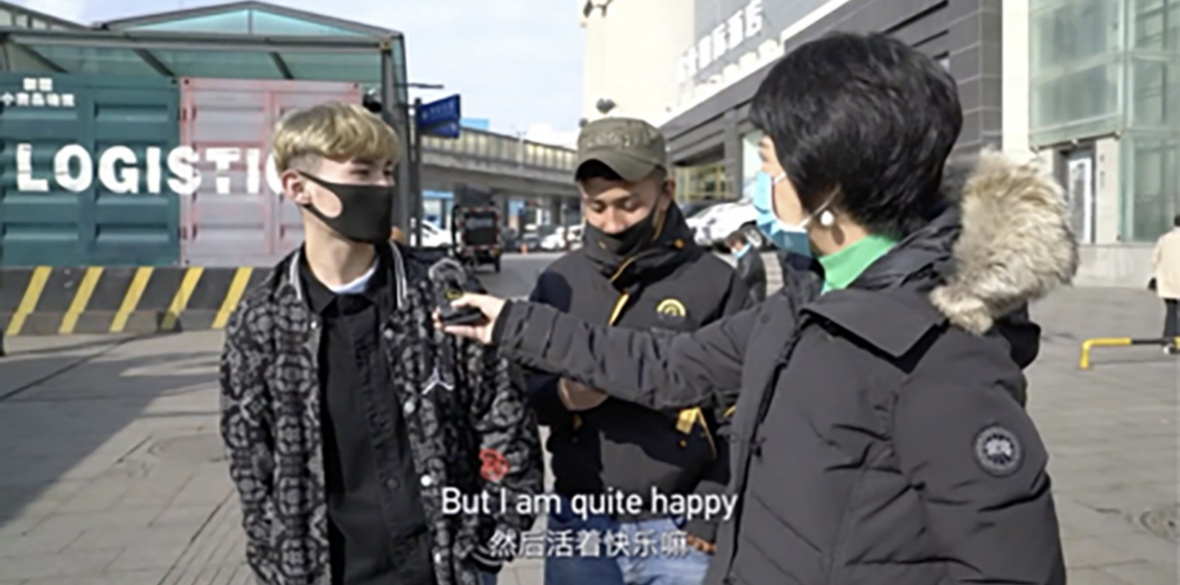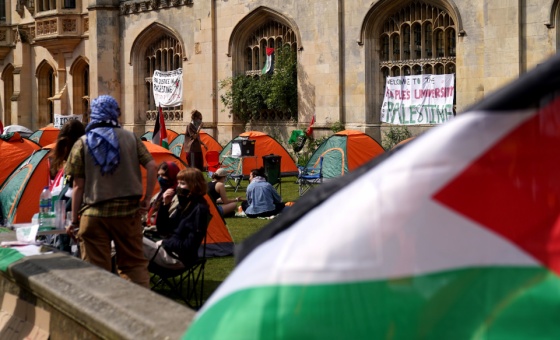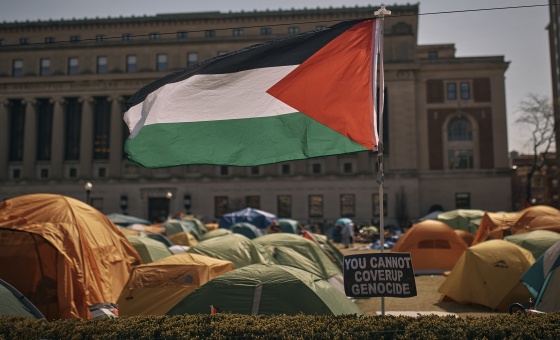This is the last article you can read this month
You can read more article this month
You can read more articles this month
Sorry your limit is up for this month
Reset on:
Please help support the Morning Star by subscribing here
ARE Uighurs in Xinjiang happy about their lives?
I tried to find the answers to this question on my first trip to China’s far-western region in April.
Xinjiang has made international headlines in recent years. And the allegations of genocide and crimes against humanity have catapulted the issue to the forefront, with China coming under increasing scrutiny.
It is up to legal experts to define what exactly has happened in Xinjiang. But I was eager to visit myself, talk to locals on the ground and try to gain an understanding of their everyday lives.
I wanted to ask them how they feel about their lives. Are they happy?
I had the opportunity to sit down with Uighur officials, farmers, workers, scholars, lawyers and an imam — both in the capital, Urumqi, and in the city of Kashgar in southern Xinjiang.
But I also wanted to talk randomly to people on the streets. What could they tell me?
In order to get genuine answers, I went “undercover.” I didn’t tell people where I came from, and nobody asked.
I didn’t carry any recognisable logo. My team consisted only of me and two cameramen, and in the case of Kashgar, an additional Uighur translator.
My interviewees had full discretion as to whether or not to talk to me.
This was probably the first time in Xinjiang that such vox-pop interviews were ever conducted, as I could find no such materials.
To ensure that the conversations wouldn’t be construed in the editing process, I left the original sounds intact, adding only English subtitles.
In each case, I interviewed about 20 people and was able to compile two separate reports, which were published on CGTN’s social media platforms and its TV channel.
So what were my findings?
In Urumqi, I waited in front of a busy bus stop near the capital’s central station.
In order to get an authentic mix of samples, I approached people of different ethnicities, genders and ages.
But the majority of my interviewees were Uighur men and women.
My question was simple: “If you were to rate your life on a scale of 0 to 10, what score would you give?”
Some people didn’t want to stop. Others declined to answer me after hearing my question.
A few told me they could not understand Mandarin, the standard language used across China.
In such cases, I could only shrug my shoulders and move on. But the great majority of them were willing to open up and talk.
The responses from Uighur interviewees turned out to be overwhelmingly positive, with ratings mostly from seven upwards.
A few even gave their lives the full score. When explaining their answers, many felt satisfied with the overall state of their lives, but less satisfied with the economy, more specifically, jobs.
One young Uighur man who gave a rating of seven explained he was not able to find a good job and, as a result, could not make his parents happier.
His feelings were echoed by another Uighur man who expressed his concerns over the economic situation, although he gave a higher rating of eight.
Admittedly the picture was mixed. One Uighur woman gave me a decisive full score before I could even finish asking the question.
She told me she was in the garment trade and just had a baby. She was busy delivering goods to her customers and both her business and life were “exceptionally good.”
I was most intrigued by the response of a young Uighur couple who were apparently waiting for their bus.
They were holding hands and talking intimately when I approached them. They answered my question with a big smile.
They defined themselves as young people working hard for the future. When asked whether they plan to stay in Urumqi, they replied with a definite yes.
In Kashgar where Uighur people make up 92.6 per cent of the local population, responses to my informal life satisfaction survey largely mirrored those in Urumqi.
This time, I talked only to Uighur residents and their responses, except in one case, were even higher up on the echelons of the scale I provided. Many gave ratings of nine or 10.
One Uighur man from a nearby village deducted one to two points. He cited the less than satisfactory sanitary conditions as the reason.
One Uighur woman running a souvenir shop was visibly unhappy about the lack of business during the pandemic, rating her life five out of 10.
One older Uighur man who was selling handmade sweets regaled me with tales of his hard-working family business and his hopes that his children would take the reins in the future. He gave his life a full score.
A younger Uighur girl lamented about how she had difficulty with her studies in the past. But that has changed for the better.
Each interviewee had a different story to tell, but they mentioned something in common: the remarkable improvements in infrastructure such as roads, housing, sewage and electricity, and better social services such as higher reimbursements of medical insurance.
This coincided with what I saw with my own eyes during the trip both in cities and in the countryside.
Roads were well paved; villages houses were organised and renovated and rural medical facilities were in good condition.
I have been told Xinjiang allocates 70 per cent of its public expenditure to improving people’s livelihoods. The resulting benefits have been clearly felt by local residents.
(Inside a county clinic in Kashgar Prefecture Source: Liu Xin)
Their children’s ease of education was another factor mentioned.
This also echoed what I learnt during the trip. In one village home that I visited, I saw a piece of paper on the door, detailing how much in subsidies the children in the household are entitled to and how much they received.
I was told since December 2017, every child in southern Xinjiang has been eligible for 15 years of free education, from kindergarten to senior high school.
They also receive subsidies for school meals, textbooks, transport, etc. This was on top of the 12-year free education that had been enjoyed in the region.
The 15-year free education policy is expected to be rolled out across Xinjiang in the near future. This is a preferential policy for areas with higher percentage of ethnic minorities.
(Inside the Ancient City of Kashgar Source: Liu Xin)
My mini happiness surveys wrapped up successfully, but the experience has become deeply engrained in my mind.
I am fully aware of the limits and deficiencies of the statistics I gathered. Nevertheless, it was evident to me that the great majority of them are genuinely and reasonably content.
They were serious in answering my questions, and the spontaneity of their answers was not something that could be staged or faked.
What touched me the most was the sense of hope for the future. Despite difficulties in life, they are trying their best, with the help of local authorities.
Considering what the region has experienced in terms of instability and poverty, such positivity is even more precious.
I hope that my videos show people a slice of life, an authenticity that is rarely depicted by the international media when covering Xinjiang.
Behind the cold, hard numbers and arguments are real people. People whose voices are so often lost in the maelstrom of political point-scoring. They deserve to be heard.
My first trip lasted 14 days. I was dazzled by the diversity of the region. I know I will go back sometime in the future.












